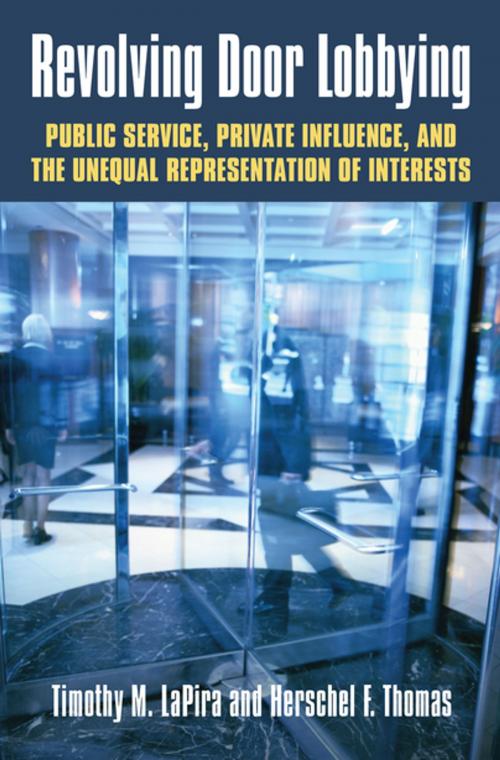Revolving Door Lobbying
Public Service, Private Influence, and the Unequal Representation of Interests
Nonfiction, Social & Cultural Studies, Political Science, Government| Author: | Timothy M. LaPira, Herschel F. Thomas III | ISBN: | 9780700624515 |
| Publisher: | University Press of Kansas | Publication: | June 23, 2017 |
| Imprint: | University Press of Kansas | Language: | English |
| Author: | Timothy M. LaPira, Herschel F. Thomas III |
| ISBN: | 9780700624515 |
| Publisher: | University Press of Kansas |
| Publication: | June 23, 2017 |
| Imprint: | University Press of Kansas |
| Language: | English |
In recent decades Washington has seen an alarming rise in the number of “revolving door lobbyists”—politicians and officials cashing in on their government experience to become influence peddlers on K Street. These lobbyists, popular wisdom suggests, sell access to the highest bidder. Revolving Door Lobbying tells a different, more nuanced story. As an insider interviewed in the book observes, where the general public has the “impression that lobbyists actually get things done, I would say 90 percent of what lobbyists do is prevent harm to their client from the government.”
Drawing on extensive new data on lobbyists’ biographies and interviews with dozens of experts, authors Timothy M. LaPira and Herschel F. Thomas establish the facts of the revolving door phenomenon—facts that suggest that, contrary to widespread assumptions about insider access, special interests hire these lobbyists as political insurance against an increasingly dysfunctional, unpredictable government. With their insider experience, revolving door lobbyists offer insight into the political process, irrespective of their connections to current policymakers. What they provide to their clients is useful and marketable political risk-reduction. Exploring this claim, LaPira and Thomas present a systematic analysis of who revolving door lobbyists are, how they differ from other lobbyists, what interests they represent, and how they seek to influence public policy.
The first book to marshal comprehensive evidence of revolving door lobbying, LaPira and Thomas revise the notion that lobbyists are inherently and institutionally corrupt. Rather, the authors draw a complex and sobering picture of the revolving door as a consequence of the eroding capacity of government to solve the public's problems.
In recent decades Washington has seen an alarming rise in the number of “revolving door lobbyists”—politicians and officials cashing in on their government experience to become influence peddlers on K Street. These lobbyists, popular wisdom suggests, sell access to the highest bidder. Revolving Door Lobbying tells a different, more nuanced story. As an insider interviewed in the book observes, where the general public has the “impression that lobbyists actually get things done, I would say 90 percent of what lobbyists do is prevent harm to their client from the government.”
Drawing on extensive new data on lobbyists’ biographies and interviews with dozens of experts, authors Timothy M. LaPira and Herschel F. Thomas establish the facts of the revolving door phenomenon—facts that suggest that, contrary to widespread assumptions about insider access, special interests hire these lobbyists as political insurance against an increasingly dysfunctional, unpredictable government. With their insider experience, revolving door lobbyists offer insight into the political process, irrespective of their connections to current policymakers. What they provide to their clients is useful and marketable political risk-reduction. Exploring this claim, LaPira and Thomas present a systematic analysis of who revolving door lobbyists are, how they differ from other lobbyists, what interests they represent, and how they seek to influence public policy.
The first book to marshal comprehensive evidence of revolving door lobbying, LaPira and Thomas revise the notion that lobbyists are inherently and institutionally corrupt. Rather, the authors draw a complex and sobering picture of the revolving door as a consequence of the eroding capacity of government to solve the public's problems.















